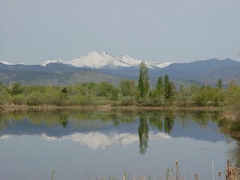Brush, Colorado is a pleasant town on the I-76/South Platte/Overland Trail corridor, about 90 miles east of Longmont. Remember their Carnegie Library? Brush was named in 1882 after Jared L. Brush (1835-1913), a gold miner, rancher, and a future legislator. Surprisingly, Brush was from the Johnstown area and never actually lived in the area but his cattle did . A story is told about a hungry military brigade in 1867, led by Mr. Brush himself, finding a large sugar beet growing in the wild, along the South Platte. The beet was suspected to have grown from a seed dropped by previous campers, and was kicked out of the ground by Brush, cooked, and happily devoured by the troops. This was one of the first sugar beets grown in Morgan County, if the tale is to be believed.
The first push for sugar beets as a cash crop in the Brush area came from the editor of the Brush Tribune, in the spring of 1900, who obtained a quantity of free beet seed from the Loveland factory, and offered them to any farmer who would commit to planting them. The crop trial was a noted failure because the farmers did not give the seed the necessary attention.
The second push for the beet crop in the Brush area came a few years later from local resident A. J. Morey who was a sheep rancher and beet grower, four miles northwest of town. In 1903, he sold his sheep enterprise and became a field manager with the Great Western Sugar Company in Longmont, where his brother, Chester. S. Morey was president of the factory there. Over the next few years, he gradually convinced Brush farmers to grow sugar beets, eventually getting 5,000 acres under contract by 1905.
By this time, like many other northern Colorado towns, Brush wanted a sugar factory. A committee was formed which made their case to the Great Western (GW) Sugar Company but GW was not convinced, especially due to a lack of irrigation in the area. As Candy Hamilton explains, the local investors and farmers were not to be denied, and they raised enough capital to fund four irrigation projects, from sources like the Platte River to the north and Beaver Creek, east of Brush. Upon the completion of these projects in 1905, GW agreed to build a factory in Brush.
The site chosen was eight acres touching the northeast corner of the city, and E.H. Dyer and Brothers of Cleveland, OH was selected to build the factory and install its equipment. This was the same company that built the Greeley factory, and you can notice that their factories look different from the more shoebox-like factories built by Kilby (also of Cleveland), like that at Eaton or Longmont.

Built to slice 600 tons of beets per day, the Brush factory opened on October 11, 1906 with A. J. Morey as manager. In the two-story office building to the right of the factory (above), the first floor was used for factory administration while the second floor housed some of the bachelors in charge of the factory.
The Brush factory operated until 1955, the same year that the Ft. Collins factory was shut down. Drought and wind in the 1950s, and sugar price pressure were the cited causes, leading to consolidation of GW factories. It didn't help Brush that there was another factory just ten miles away (next stop in the series!).
As mentioned in Hamilton's book, if you were in the Brush area today, you'd be hard-pressed to know that a sugar beet factory ever existed there. It is fortunate that the USGS quads still show the Brush factory site, marked as "Sugar Refinery" with the railroad tracks leading up to it. (You can find many old USGS Colorado maps over at the great archive.org)

Out in this area today, the only remains you'll find is part of the factory warehouse, where the finished sugar was stored before it was shipped.
Pictures from January 2009:

This structure is in use today as a grain warehouse.


Next up, Fort Morgan.
Continuing series on the northeastern Colorado beet sugar factories:

 One citizen's view of Longmont, Colorado, USA.
One citizen's view of Longmont, Colorado, USA.

No comments:
Post a Comment